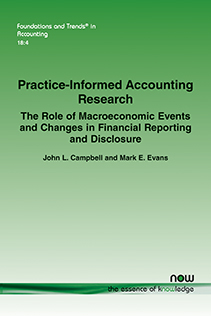Practice-Informed Accounting Research: The Role of Macroeconomic Events and Changes in Financial Reporting and Disclosure
By John L. Campbell, Professor and Herbert E. Miller Chair in Financial Accounting, University of Georgia, USA, johnc@uga.edu | Mark E. Evans, Associate Professor and Dale K. Cline Associate Dean for Accountancy, Wake Forest University, USA, evansme@wfu.edu
Abstract
Donors to major universities have increasingly questioned the amount of money spent to produce academic research, perhaps due to its link (or lack thereof) to practice. Indeed, not all research needs to have a direct link to practice. However, using events of recent macroeconomic cycles, we show that practice-informed accounting research is a large subset of academic research that provides important evidence on the extent to which financial disclosures provide information to anticipate firm performance. Specifically, we focus on the “emergence of derivatives, the internet, and terrorism” cycle (1995–2008) and the “digitalization of information, computing power, climate, and pandemic” cycle (2009–2020). We demonstrate how these cycles led to greater scrutiny of accounting disclosures, regulatory action, and subsequent research on the effectiveness of disclosure regulation. We also provide thoughts on future trends that could drive upcoming macroeconomic cycles and subsequent research that is likely to be needed. Finally, we impart advice to current and future accounting academic researchers for how they can develop the necessary institutional knowledge to execute relevant practice-informed research while also discussing the pros and cons of doing so. Overall, we demonstrate that a subset of accounting research is intricately linked to the macroeconomy and finds that investors generally respond effectively to disclosure; however, there are instances where markets are surprised by firm performance at least partly due to ineffective disclosure, and unintended consequences resulting from regulation designed to improve disclosure.
Practice-Informed Accounting Research: The Role of Macroeconomic Events and Changes in Financial Reporting and Disclosure
In an era where academic research faces scrutiny for its value to the business world, Practice-Informed Accounting Research delves into the intersection of accounting research and practical application. By exploring the relationship between macroeconomic events and financial disclosures from the mid-1990s to 2020, the authors examine how disclosures help predict firm performance amidst market booms and busts. The monograph focuses on two significant cycles: the dotcom bubble and the 2008 financial crisis, and the post-crisis digital transformation era, including the impact of emerging technologies and global events like COVID-19. The research highlights the evolving role of financial reporting in shaping investor decisions and regulatory actions. The authors, drawing on their own extensive industry experience, offer guidance for young researchers on obtaining relevant institutional knowledge, while advocating for practice-informed research that remains grounded in evidence, unclouded by advocacy, to better understand the complex dynamics of financial accounting and disclosure in a changing economic landscape.
